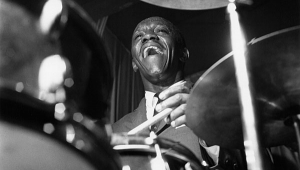| Columns Retired Columns & Blogs |
Tannhäuser: Wagner's "problem" opera Page 3
Italian bootlegs of the Bayreuth Version, usually from the '50s, pop up and disappear overnight, usually in awful sound and joyless performances. The 1954 Bayreuth Festival performance on Hunt 3 CDLSMH 34032 is no exception, Joseph Keilberth's forceful if grim conducting notwithstanding. An exhausted-sounding Ramon Vinay forces himself, barking, through the title role, with never an ounce of joy in his voice even in Act II; his Tannhäuser sounds irredeemably dissolute, hopelessly cynical throughout, reminding one, for all the wrong reasons, just how wretched a Minnesinger this is. It's appropriate that Tannhäuser sound like a broken old man in Act III, not in I and II. Gre Brouwenstijn's Elisabeth is overripe but impassioned (though her Act III "Allmächt'ge Jungfrau" goes on forever), Herta Wilfert is a convincing Venus, Josef Greindl grinds away as usual at Hermann, and Fischer-Dieskau, of course, steals the show as Wolfram.
The rather dry tape pumps and breathes, though it's not the worst bootleg I've heard. Still, with five other far superior recordings available, and other than the fact that Vinay gives a perfect example of the notorious, now thankfully historical "Bayreuth bark," who needs it?
Anyone interested in Tannhäuser most certainly does need Wolfgang Sawallisch's 1962 Bayreuth recording (Philips 420 122-2), which is nearly perfect in every way. Wolfgang Windgassen absolutely outsings himself here, heart-torn as Tannhäuser, and his Act II duet with Anja Silja is sheer vocal excitement. Eberhard Wächter's heroic Wolfram is the staunchest of loyal friends, a noble Horatio; Grace Bumbry (the famous "Black Venus") plays the goddess as the quintessential ice queen—it almost works—and the pure- and girlish-voiced Silja bursts onto Act II like War and Peace's (Tolstoy's, not Prokofiev's) Natasha from her light-drenched room. Wilhelm Pitz works his usual choral magic, and even Joseph Greindl has matured wonderfully since '54.
Philips's sound is sumptuous, if just a tad harsh, communicating Bayreuth's unique string sound to near perfection. But that would mean little without Sawallisch, one of the most underrated conductors of the 20th century. His Tannhäuser is intense, driven, passionate, headlong, wonderfully disciplined, with nary a false step. In fact, this is the sort of reading I expected from Sinopoli—but more of that later.
Amazingly, after half a dozen earlier recordings of the opera, the full Paris Version was not set down on tape until Georg Solti's triumphant 1971 transcription for London/Decca (414 581-2). Solti certainly made up for lost time. Having already recorded Tristan und Isolde and the world's first studio Ring cycle during the previous decade, Solti was well-primed to bring out the Tristan and Götterdämmerung flavors in Tannhäuser that, before him, had lurked in the score more hidden than revealed. His Overture and Venusberg are almost demented in their intensity and rapture, perfectly matched by the Vienna Philharmonic's deep, dark, infinitely smooth virtuosity, the Sofiensaal's sumptuous sound, and producer Ray Minshull's carrying-on of John Culshaw's torch. As a pure delight in terms of both sensuality and sound, this recording stands head and shoulders above the rest.
The vocalists are another story. René Kollo does an admirable acting job, but at the expense of his singing—only he and Windgassen seem to attempt to fully come to grips with Tannhäuser's tortured body/spirit dilemma. But Kollo's voice too often comes out tortured in fact, strained and strangled; a valiant, noble failure. Christa Ludwig's Venus, despite some heavy electronic processing for dramatic purposes that interferes with her diction, remains the standard to be judged by: rich, appropriately overripe, juicy, all feeling and little thought—a perfect Venus. Helga Dernesch has to reach for Elisabeth, her singing thin and just a bit out of control, and Hans Sotin as Hermann and Victor Braun as Wolfram are unmemorable. Still, it's hard to fault this recording too much, so satisfying is it as music and drama, especially when the weaknesses of some of the singers seem so hand-in-glove with their characters' blind spots—understandable vocal type-casting.
- Log in or register to post comments



































